America’s Meat Companies Fill the “Protein Gap” to Help End Hunger in the United States
October 10, 2022 | 4 min to read

WASHINGTON, DC – Aligned with the Biden administration’s goal of ending hunger in the United States and with the White House Conference on Hunger, Nutrition, and Health, the North American Meat Institute and America’s leading meat companies are advancing industry-wide best practices and increasing access to nutrient-dense meat for families in need.
The Meat Institute shared with White House Conference organizers its commitment, made through the Protein PACT for the People, Animals and Climate of Tomorrow, to help measure and fill this “protein gap” by 2025. The Meat Institute has also formally designated food security as a non-competitive issue, which will facilitate industry-wide information sharing and implementation of best practices as the sector works with the White House and all stakeholders to end hunger.
Meat Institute President and CEO Julie Anna Potts commented:
“According to Feeding America, meat is one of the top three most needed foods for food charities. Yet, meat represents just 1% of food distributed by food charities, in part due to limited capacity to limited infrastructure for cold storage, packing, and distribution.
The resulting “protein gap” worsens hunger and particularly impacts women, children, and older adults who have greater need for the nutrients, vitamins, and minerals best and sometimes only found naturally in animal-source foods.
Filling the “protein gap” is a top priority for the Meat Institute and its members, who have committed to act on a non-competitive basis to help end hunger in the United States by openly sharing information and advancing industry-wide implementation of best practices, like investing in protein pack rooms and refrigerated transportation.”
Meat Institute members are taking significant steps to achieve this ambitious commitment. For example, Cargill announced in August a new $4.9 million donation to Feeding America, including to build and expand protein pack rooms. JBS has donated more than $2 million for improvements in cold storage and distribution, along with contributing to food safety training and safe meal preparation. This month, Tyson Foods donated $2.5 million to Feeding America, allocating $1 million to Equitable Food Access grants, and 2.5 million pounds of protein.
An index containing additional examples of Meat Institute member efforts to end hunger is available here .
During a July 12 stakeholder session convened by the Protein PACT to provide input for the White House Conference, food security experts and partners across animal agriculture highlighted the critical role of meat in ending hunger.
Dr. Craig Gundersen, Snee Family Endowed Chair at the Baylor University Collaborative on Hunger and Poverty (BCHP), emphasized:
“America’s meatpackers and processors provide safe, affordable, nutritious, and culturally appropriate foods that are key to ensuring food security for Americans at all income levels. Federal nutrition assistance programs like SNAP have been successful in reducing hunger and should be protected and expanded, including to ensure the dignity and autonomy of SNAP participants to choose foods for themselves and their families.”
Kuda Mako-Mushaninga, MPH, MS, RD, Vice President of Scientific Affairs for National Dairy Council commented:
“People need food to survive, and they need nutrient-dense animal-source foods like dairy to thrive. Federal nutrition assistance, school meals and away-from-school meals programs, and other initiatives have an opportunity to expand access to dairy as a critical source of nutrients, vitamins, and minerals necessary for growth, development, and healthy aging.”
Diane Sullivan, co-founder of Equitable Spaces concluded:
“The 50 million Americans who have faced hunger are experts in navigating the inequities and lack of political will driving hunger. Their voices, experiences, and dignity must be at the center of solutions that put safe, affordable, culturally appropriate food on tables and finally end hunger in America.”
###
About North American Meat Institute
The Meat Institute is the United States’ oldest and largest trade association representing packers and processors of beef, pork, lamb, veal, turkey, and processed meat products. NAMI members include over 350 meat packing and processing companies, the majority of which have fewer than 100 employees, and account for over 95 percent of the United States’ output of meat and 70 percent of turkey production.
About the Protein PACT: The Protein PACT unites partners across animal protein in the first-ever joint effort to accelerate the entire animal protein sector’s progress toward global sustainable development goals for healthy people, healthy animals, healthy communities, and a healthy environment. Protein PACT partners are establishing transparent baselines and benchmarks for our efforts, setting ambitious targets for continuous improvement, collecting data to verify and transparently report on progress, and launching comprehensive communications about animal protein’s unique place in sustainable, healthy diets. To learn more, visit www.TheProteinPACT.org.
